HUNGRY NINETIES
The economic depression
of the 1890s was a formative experience for the Australian colonies.
For the first time, thousands were without work. For the few who were
lucky enough to have a job, conditions were hard - long hours, little
pay and dangerous circumstances. While the social impact of this experience
was enormous, there were also political implications. People began
to ask why there was so much human suffering when there was so much
technological progress.
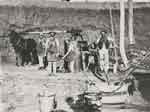
Photo of
men making bricks by hand in South Australia. Courtesy of the State
Library of South Australia.
For
an increasing number of people, the answer was greed on the part of
the owners of industry. This led to the beginnings of the labour movement
in Australia in an effort to enforce better working conditions as
well as employment opportunities for the workers. One expression of
this was the birth of the Labor Party in Queensland in 1891. Another
was the formation of unions and the attempt to use strikes to force
industry owners to come to the bargaining table. The 1890s, then,
was a decade in which the workers began to argue for a place in decision
making at the very time when the various colonies were beginning to
debate whether or not to federate. This meant that any discussions
on the role of a Federal Government had to take on the concerns of
the working people.
|
Some of these issues are reflected in the political cartoons and other
pictures of the day. These images record some of the effects of the
economic depression and give glimpses into the lives of the working
class and their attitudes towards their bosses.
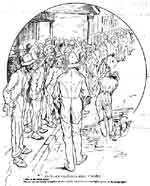
Livingston
Hopkins, "Envy - An everyday Street Scene", Bulletin, 6 October 1894,
p.5. By permission of the National Library of Australia.
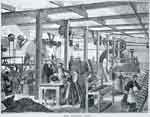
Drawing
of the "Geelong Woollen Mill" showing working conditions. By permission
of the National Library of Australia.
LONG HOURS
FOR LITTLE PAY
One of the results
of the economic depression was a shortage of jobs. This meant that
employers could exploit their workers in the knowledge that there
were plenty of other people to take their place. As one of these cartoons
indicates, jobs
|
were very scarce and most people envied those who had one no matter
how menial.
Working
conditions were very poor. The average labourer worked 10 hours a day.
There was no minimum wage and exploitation was frequent. The effect
on families was devastating - people lived in shanty towns and even
then they lived in fear of losing the roof over their heads.
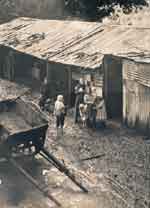
Photo of
a family in Paddington, Sydney. Courtesy of the Mitchell Library, State
Library of NSW.
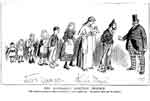
Livingston
Hopkins, "Jack's Landlord - Halves Please!" Bulletin, 1 July 1893, p.1.
By permission of the National Library of Australia.
Previous
page | Next
page |





